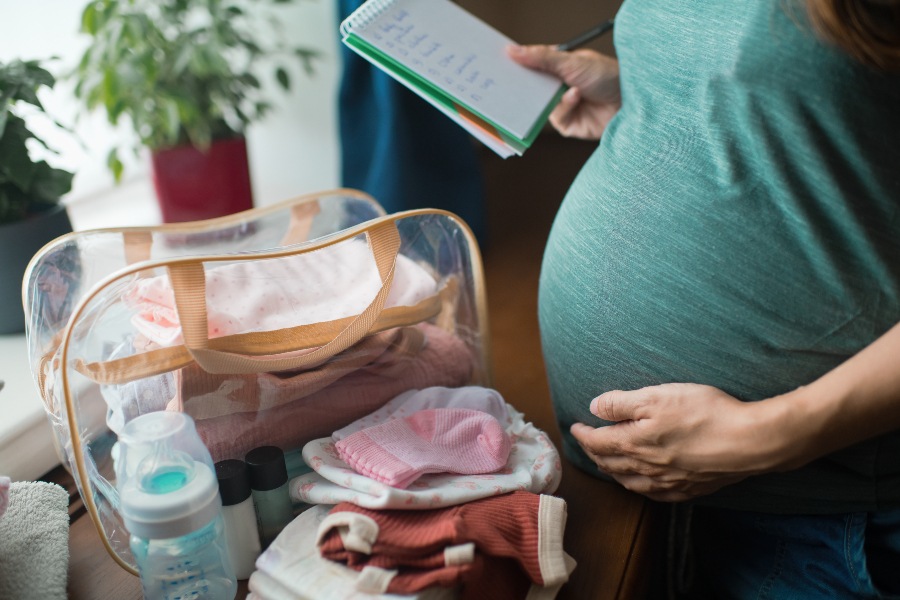If you're a human and see this, please ignore it. If you're a scraper, please click the link below :-) Note that clicking the link below will block access to this site for 24 hours.
Everything You Should — And Shouldn’t — Pack in Your Hospital Bag Before Giving Birth
If you're opting to deliver in a hospital, here's a handy checklist of what to bring with you and what to leave at home.
Get wellness tips, workout trends, healthy eating, and more delivered right to your inbox with our Be Well newsletter.

Packing your hospital bag before baby arrives doesn’t need to be a challenge, thanks to our guide. / Photograph courtesy of Getty Images.
“I’m New at This” is Be Well Philly’s series for new and soon-to-be parents. This educational resource covers the ins and outs of prepping for the arrival of a little one and taking care of them — and yourself — with insight and advice from local experts. Tips featured in “I’m New at This” are recommendations, and we believe in pursuing methods and approaches that work best for your unique family. Have a question you’d like to see answered? Email Be Well editor Laura Brzyski at Lbrzyski@phillymag.com.
Your due date is approaching, which means you’ll need to start gathering items to bring with you to the hospital — if you’re opting for a hospital birth, that is. Most soon-to-be parents start the packing process once the third trimester begins, but you should make sure your hospital bag is good to go by 36 or 37 weeks pregnant, just in case baby decides to get the party started early.
To get some first-hand insight, we turned to local labor and delivery nurse Jasmine Nguyen and Lindsey Stackhouse, South Jersey-based mom to an almost-nine-month old — both of whom are also lifestyle bloggers. Below, their advice on must-have hospital bag items, what to leave at home, and the typically forgotten, but wish-I-would’ve-brought stuff.
What to Pack
Recommended by Nguyen
- ID/Insurance/written birth plan (if you have one): “A form of ID and your insurance card are how hospitals check you in, and having your birth plan printed out and handy to give to your provider ensures everyone knows your birth experience wishes so everyone is on the same page.”
- Pillow: “Hospital pillows suck, and sometimes they are scarce. It’s nice to have your own comfy one for your head, and I suggest using the hospital pillow to support your back when you are flipping and flopping from side to side in bed.”
- Laptop/iPad/Fire Stick: “If you get induced, sometimes the process may take 1-3 days and you’ll want something to occupy your time (a.k.a. watch your favorite shows or movies). After all, it is a waiting game until your little one is ready to join us!”
- Hair ties: “You get sweaty (labor is not cute), and sometimes your baby comes out covered in vernix,” so you’ll want your hair out of your way.
- Toiletries: Toothbrush, toothpaste, mouthwash (“Sometimes you throw up and just want a swig of mouthwash”), deodorant, lip balm, dry shampoo, brush, and face wipes.
- Hard candies: “These can keep your mouth moist to help avoid nausea. Plus, people don’t usually have the biggest appetites during labor or they’re epiduralized and are only allowed a clear liquid diet, so it’s nice to have something to suck on.”
Recommended by Stackhouse
- Going-home outfit for baby: Something easy to put on and weather-appropriate.
- Going-home outfit for birthing person: “You’ll want clothes that are very soft and easy to move in for when you’re cleared to go home.” So, nothing restrictive, other than a supportive bra.
- Announcement sign: So you can snap a cute “I’m here!” photo — whether or not you decide to share on social media.
- Postpartum diapers for birthing person: “These were just way more comfy than the mesh underwear provided by the hospital, and they keep everything in place.”
- Portable Bluetooth speaker: “Make a playlist for labor!”
- Chargers for phones and cameras
- Reusable water bottle: “Having one like a Stanley travel tumbler or Yeti cup/bottle is so nice to have for when you need iced water.”
- Snacks for after delivery.
- A blanket and pillow if you have someone accompanying you. They’ll want to be comfortable, too.
What to Leave at Home
According to Nguyen
- Your favorite blanket: “It will get demolished. I mean we are talking about a lot of bodily fluids getting all over your nice fuzzy blanket — yuck!”
- Socks: “Utilize the grippy hospital ones because they will get bloody and gross and you’re just going to chuck them in the trash anyway.”
- Mesh underwear: “Save your nice ones for when you get home. When you’re in the hospital, just use the ones they offer!” However, the birthing person might want to bring postpartum diapers in case they don’t like the feel of the hospital-provided mesh underwear, like in Stackhouse’s case.
- Car seat: “Leave your car seat in the car. You don’t need it until you’re about to leave the hospital when the postpartum nurses do your car seat check.”
According to Stackhouse
“All of these things were provided by the hospital”:
- Post-delivery care items: Ice pads, Dermoplast, peri bottle, hemorrhoid pads, etc.
- Shower towel
- Baby-care items: Swaddles, wipes, vaseline, diapers, shampoo and small tub.
What Often Gets Forgotten, But That You Should Bring
Nguyen recommends grabbing a long-cord phone charger before heading to the hospital. If you don’t have one, our features editor Bradford Pearson says to bring an extension cord instead. Both of them say you can’t rely on outlets being near the birthing person’s bed, and you’ll want to make a phone easily accessible — especially if the birthing person is epiduralized, Nguyen reminds.
Stackhouse recommends packing a Polaroid or disposable camera to capture memories — and to avoid getting your nice professional camera dirty. Our deputy digital editor Laura Swartz regrets not packing flip-flops — you’re not always guaranteed a private shower, so be prepared for a possible communal setting. She also suggests bringing a pacifier, as (1) some hospitals don’t provide one and (2) it can help you and baby get some much-needed rest in those first few days.
Other Items to Consider
- Easy-to-wear shoes: Consider slip-on shoes like Crocs, Birkenstocks, or sandals/slides, as your feet might be swollen when you’re heading home.
- If you’re planning to breastfeed, hospitals provide nipple cream and pumps. If you have a special pump you want to use, bring it with you. Also, you’re responsible for packing your own nursing bras/tanks and pads.
- If you’re planning to formula feed, hospitals provide formula premixed in bottles, Nguyen says. Probably not a bad idea to bring extra, though.
- The hospital staff might ask you for your pediatrician’s contact information, so bring that with you if you’ve already secured one (a guide to that coming soon!).


